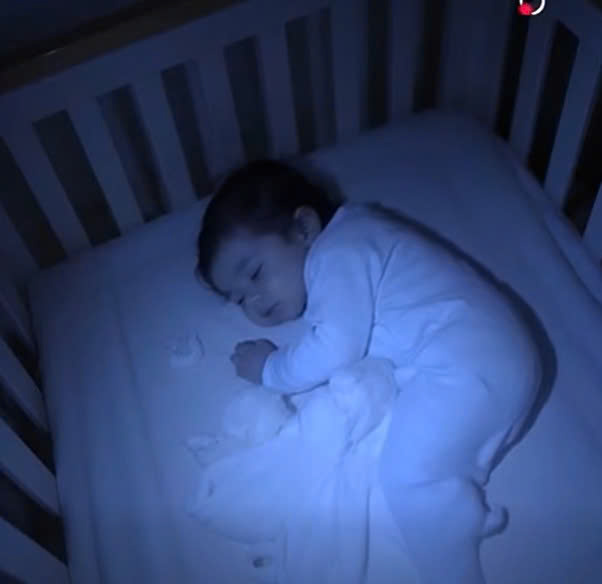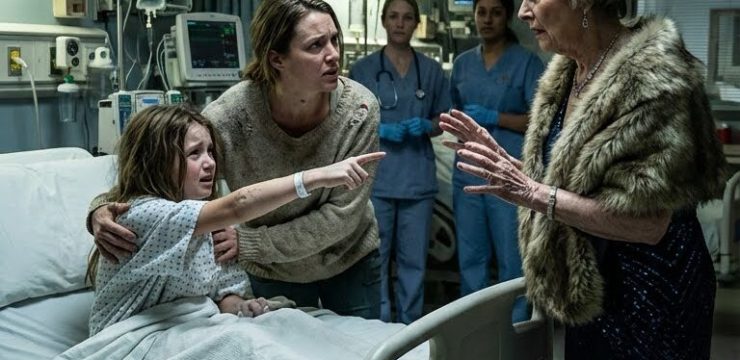From the moment our daughter Lila came home from the hospital, she was the kind of baby every parent dreams about. She never cried through the night, never fussed, and always slept soundly. While other parents talked about sleepless nights and constant crying, our evenings were calm. Lila would curl up in her little yellow duck blanket, her tiny breaths soft and steady, like a sleeping kitten. My husband, Adrian, and I would sit on the couch, sipping cocoa and listening to the lullaby from her crib through the baby monitor. I remember thinking, This is happiness. This is what peace feels like. Every night, Adrian would quietly step out of her room, smiling like he had done something magical. “She’s asleep in two minutes. I must have the touch,” he’d joke. I’d laugh, teasing him back, “Or maybe she just knows who’s in charge.” Those evenings were filled with warmth and gratitude. We felt lucky, content, maybe even a little smug about how easy parenting seemed for us.

Then, one night, the noises started.
The first time, I woke around 3:15 a.m. The house was quiet, except for Adrian’s soft snoring beside me. I was just about to drift off again when I heard a faint sound — a soft rustle, like fabric shifting. It came from Lila’s room. I sat up, straining to listen. The sound stopped, then started again. I nudged Adrian. “Do you hear that?” He groaned, half-asleep. “It’s probably nothing, Riss. She’s just turning over.” But something about it didn’t feel right. I slipped out of bed and padded down the hall, the wooden floor cold beneath my feet. The door to Lila’s room creaked as I opened it slowly. The glow of the night-light bathed everything in a soft golden hue. The toys were neatly in their basket. The mobile turned lazily above the crib. Lila was fast asleep, her face peaceful. Nothing seemed out of place. I stood there for a full minute, waiting for something to move, but all I heard was silence.
The next night, it happened again. And again after that. The same faint, almost human-like rustling, always around the same time. By the third night, Adrian was losing patience. “Riss, it’s just the house settling,” he said, rubbing his eyes. “This place is old. The vents, the pipes, something like that.” But I couldn’t shake the unease. “It sounds like someone’s in there,” I said. “What if one night I open the door and—” I hesitated. “And someone’s actually standing there?” Adrian chuckled, trying to lighten the mood. “What? A ghost changing diapers?” I didn’t laugh.
The following day, I ordered a baby monitor with video, night vision, and remote viewing — just to be sure. My friend Alyssa teased me. “You’re being paranoid,” she said, but still recommended a good one. When it arrived, I set it up above Lila’s crib. The video quality was so sharp I could see every detail, even her tiny fingers clutching the blanket. That night, I felt reassured for the first time in days. As Adrian kissed my forehead and drifted off, I stared at the monitor’s screen, watching Lila’s gentle breathing. Everything was perfect — until fifteen minutes later.
A piercing cry shattered the silence. I sat up so fast the monitor almost fell from my hand. Lila’s terrified wail filled the room. The screen flickered with static — and for one chilling second, I saw it: a dark shape behind the crib, broad shoulders, an arm reaching in. My heart stopped. “Adrian!” I screamed, jumping from the bed. I sprinted down the hallway and threw open the door to the nursery. Lila was crying hard, her face red and wet with tears — but the room was empty. I checked under the crib, behind the curtains, even the closet. Nothing. Then I noticed her bottle lying on the floor near the rocking chair. I picked it up — and froze. It was warm, freshly heated. My hands trembled.
Adrian stumbled in, half-awake. “What’s going on?” I held Lila close, trying to calm her. “Someone was in here,” I said. “I saw it on the monitor. A shadow, reaching toward her. And this bottle — someone warmed it!” He frowned, confused. “Are you sure you didn’t do it in your sleep? You’ve sleepwalked before.” I shook my head. “I didn’t. And even if I had, why would I leave it on the floor?” He sighed, checking the home security app on his phone. “No alarms went off. No doors opened. The system’s clean. It’s just stress, Riss. You’re exhausted.” But I couldn’t believe that. Something felt wrong.
As I laid Lila back in her crib, a chill brushed my neck. I looked toward the window — it was slightly open. When I reached to close it, something caught on the sill. A small silver pendant dangled there, shaped like a heart, cracked down the middle. My stomach dropped. I knew that pendant. I hadn’t seen it in years.
By morning, I couldn’t sit still. When our nanny arrived, I handed Lila over with a forced smile and clear instructions. “Please, keep her with you at all times,” I said. Then I got in the car and drove to a house I had sworn never to visit again.
The old wooden porch creaked under my steps, just like it used to when I was a child. The chipped ceramic owl still sat by the window. I hadn’t been here in years — my mother’s house. Before I could knock, the door opened. “I knew you’d come,” she said quietly. I stepped inside, fury bubbling up. “You broke into my home,” I snapped. “You had no right.” She looked fragile, smaller than I remembered. “I just wanted to hold her,” she whispered. “Just once. Just to feel her in my arms.” My voice shook. “How did you even get in? We have an alarm system.” She didn’t answer, her eyes full of guilt. Then I heard movement behind me — Adrian.
“You?” I turned, my voice trembling. “You knew?” He lifted his hands. “I caught her once. She was rocking Lila. I almost called the police, but she begged me not to tell you. She just wanted to see her granddaughter.” I could barely process it. “Why would you hide this from me?” Tears welled in my mother’s eyes. “Because you don’t know the truth — why I wasn’t there when you were little.” Her voice cracked. “Your father had someone else. When I found out, he made sure I couldn’t fight back. He had me declared unstable and sent away.” I stared at her, frozen. “That’s not true.” “It is,” she said softly. “He had help — from your Aunt Valerie. She was head of the psychiatric department. They wanted me gone.”
I felt the world tilt. My aunt, the woman who had raised me, had been part of it. My knees nearly gave out. Adrian placed a hand on my shoulder. “I didn’t believe her either, so I hired a private investigator. It’s all true. We have documents, court records. We were just waiting for the right moment to tell you.”
I looked at both of them — my husband, who had lied, and my mother, who had lived a nightmare. “I don’t even know what to feel,” I whispered. “But I’m going home. To my daughter.”
As I drove back, sunlight spilled across the road. My anger slowly shifted to something else — grief, and beneath that, a quiet hope. Maybe it wasn’t too late to rebuild. Maybe broken families could still heal. When I got home, Lila was sleeping soundly, the morning light warming her cheeks. I kissed her forehead and realized something I hadn’t felt in years.
For the first time since childhood, I believed that even the most fractured hearts could find their way back to love.





